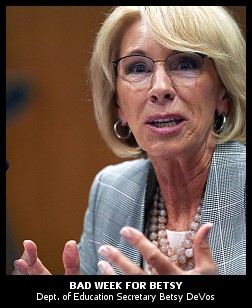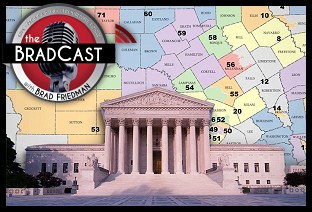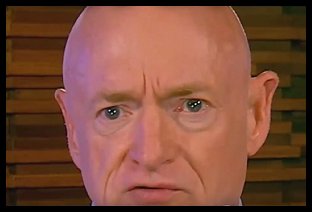 Borrowing from President Donald Trump's self-description as the "King of Debt", Forbe's Derek Newton, over the summer, dubbed U.S. Secretary of Education Betsy DeVos as the "Queen of Debt".
Borrowing from President Donald Trump's self-description as the "King of Debt", Forbe's Derek Newton, over the summer, dubbed U.S. Secretary of Education Betsy DeVos as the "Queen of Debt".
DeVos is the billionaire sister of Erik Prince, founder of the murderous private mercenary firm, Blackwater, Inc. Like the President, whose foreign policy decisions are compromised by his conflicting foreign financial interests, DeVos has significant financial interests that conflict with her obligation to serve the public interest as the nation's top education official.
Citing paperwork released by the U.S. Office of Government Ethics (OGE), the Center for American Progress notes DeVos "has [substantial] investments in companies that hound students to pay their federal loan debts." Unfortunately, DeVos was not confronted with that blatant conflict-of-interest during her Senate confirmation hearings because, according to the Center, Senators were not given access to the OGE records until after her confirmation process was completed.
In his August 2018 article in Forbes, Newton bestowed the "Queen of Debt" title after the Secretary of Education pursued policies that facilitated a rise in the level of U.S. student debt to an alarming $1.5 trillion.
One of the principle means utilized by the conflicted DeVos to inflate her own wealth, while burying an entire generation of defrauded students in insurmountable debt, was to indefinitely postpone the "Borrower Defense Regulations" that had been adopted in 2016 by the Department of Education under President Obama. Those regulations were supposed to have gone into effect in July 2017.
The "Borrower Defense Regulations" were enacted in the wake of the collapse of privately-held, for-profit colleges and universities --- worthless diploma mills, like the now defunct Corinthian Colleges and the infamously fraudulent Trump University. The scam artists of those private, ostensibly "educational" institutions rake-in exorbitant tuitions paid via direct loans their students are encouraged to obtain from the federal government. Unable to secure employment after graduating with their worthless diplomas from the disreputable private institutions, the students are left facing insurmountable debt, as taxpayers pick up the tab to cover the loans those former students are unable to pay back.
According to an October 28, 2016 Department of Education formal announcement, the Obama-era regulations were expressly designed to protect students and taxpayers from predatory institutions. The 2016 regulations included provisions for debt relief for victimized students and the elimination of contractual provisions by which predatory private schools compel students to waive their right to class action lawsuits and which force students to submit to private arbitration.
In successive rulings, U.S. District Court Judge Randolph Moss has now sided with defrauded student borrowers and against DeVos and the predatory "educational" institutions she invested in prior to becoming the U.S. Education Secretary --- a position that placed her in charge of overseeing regulations meant to clean up this fraudulent mess...
DeVos Order was 'Arbitrary and Capricious'
In July 2017, shortly after the DeVos-led Department of Education issued the first of several orders to delay the "Borrower Defense Regulations", attorneys from the Public Citizen Litigation Group and Harvard Law School's Project on Predatory Student Lending filed a complaint [PDF] in the U.S. District Court in Washington D.C. on behalf of Meagan Bauer and Stephano Del Rose (Bauer v. DeVos).
Bauer and Del Rose had each incurred a $40,000 indebtedness for federal loans they received to attend filmmaking classes at the New England Institute of Arts ("NEIA"), a for-profit college. Both plaintiffs seek loan forgiveness by reason of "NEIA's [alleged] fraud and other misconduct". But both have been prevented from obtaining debt relief by reason of the stay DeVos imposed on the Department's "Borrower Defense Regulations" shortly after taking office.
This year, the Bauer student plaintiffs, joined by 19 states and the District of Columbia, filed successful motions for summary judgment in which they contested the legality of the DeVos stay orders.
In a September 12 opinion and order [PDF], Judge Moss ruled that DeVos had not only violated Section 705 of the Administrative Procedures Act (APA) but that her decision to stay the "Borrower Defense Regulations" was "arbitrary and capricious."
The Department, under DeVos, sought to justify the stay by arguing that "if the final regulations are not postponed, institutions would be subject to financial responsibility trigger provisions that could impose substantial costs" on the private institutions. However, the court observed, DeVos "failed to consider how the public interest or the interests of student borrowers would be affected by [the Department's stay] decision."
Although Judge Moss agreed with the plaintiffs that DeVos had violated the APA by issuing the stay, he extended the stay until no later than Oct. 28, 2018. That extension was related to a second case, California Association of Private Secondary Schools ("CAPPS") v. DeVos. In that matter, private schools, that have been profiting from the direct federal lending scheme, challenged the 2016 Department of Education regulations that banned the use of contractual provisions confining students to arbitration. Such arbitration clauses were meant to prevent the type of federal class action lawsuits filed against Trump University. Just days after his election in 2016, Trump settled by agreeing to pay $25 million to his defunct University's defrauded students.
CAPPS filed a motion for a preliminary injunction seeking to prevent the Department from enforcing the regulation that eliminated the ability of predatory "educational" institutions to rely on those arbitration-only contractual clauses.
Last week, on October 16, Judge Moss issued an opinion and order [PDF] in which he denied the relief sought by CAPPS. Because the court did not further extend the stay, defrauded students may now finallly seek debt relief under the Obama-era "Borrower Defense Regulations".
Julie Murray, a Public Citizen attorney representing the plaintiffs, described this second decision as "a huge win for defrauded borrowers around the country". Meagan Bauer, the lead plaintiff, added: "I hope these rulings remind the Department of Education of its obligation to care for its citizens who are the future of this country and that it will start to act in the interest of students instead of focusing on lining the pockets of for-profit institutions."
Youth Vote Matters
The issues surrounding the question of students, predatory lending and debt underscore that a continuation of Republican control of the federal government poses a grave threat to the future financial security of our nation's youth. Yet, recent polling suggests that young voters may be the age group least likely show up to vote in the November 6th midterms; albeit, more young voters are expected to turnout than in past midterm elections.
The conflict between the public interest and DeVos' personal financial interests is but one of a myriad of ethical quagmires that exist within the manifestly corrupt Trump Administration and for which Congressional oversight has been sorely lacking.
With their future aspirations for financial security at stake, one would hope that cases like these would motivate maximum turnout by young Americans, leading to a change in control of one or both Houses of Congress.
 Ernest A. Canning is a retired attorney, author, Vietnam Veteran (4th Infantry, Central Highlands 1968) and a Senior Advisor to Veterans For Bernie. He has been a member of the California state bar since 1977. In addition to a juris doctor, he has received both undergraduate and graduate degrees in political science. Follow him on twitter: @cann4ing
Ernest A. Canning is a retired attorney, author, Vietnam Veteran (4th Infantry, Central Highlands 1968) and a Senior Advisor to Veterans For Bernie. He has been a member of the California state bar since 1977. In addition to a juris doctor, he has received both undergraduate and graduate degrees in political science. Follow him on twitter: @cann4ing


 SCOTUS Ruling a How-To for Unlawful Gerrymandering on 'Eve' of Critical Election Year: BradCast' 12/17/25
SCOTUS Ruling a How-To for Unlawful Gerrymandering on 'Eve' of Critical Election Year: BradCast' 12/17/25 Bricks in the Wall:
Bricks in the Wall: 'Green News Report' 12/16/25
'Green News Report' 12/16/25
 'This One Goes to 11': Weekend of Violence, Tragic Murder of Rob Reiner: 'BradCast' 12/15
'This One Goes to 11': Weekend of Violence, Tragic Murder of Rob Reiner: 'BradCast' 12/15 Sunday 'WTF?' Toons
Sunday 'WTF?' Toons Trump Now Losing One
Trump Now Losing One 'Green News Report' 12/11/25
'Green News Report' 12/11/25 Dems Continue Stunning 2025 Election Streak: 'BradCast' 12/10/25
Dems Continue Stunning 2025 Election Streak: 'BradCast' 12/10/25 Petrostates and Propagandists Undermining Climate Science: 'BradCast' 12/9/25
Petrostates and Propagandists Undermining Climate Science: 'BradCast' 12/9/25 'Green News Report' 12/9/25
'Green News Report' 12/9/25 The High Cost of Trump's Terrible Policy Making: 'BradCast' 12/8/25
The High Cost of Trump's Terrible Policy Making: 'BradCast' 12/8/25 Sunday 'All in a Day's Work' Toons
Sunday 'All in a Day's Work' Toons Dems Fight to Avoid the GOP's Massive, Year-End Health Care Cliff: 'BradCast' 12/4/25
Dems Fight to Avoid the GOP's Massive, Year-End Health Care Cliff: 'BradCast' 12/4/25 'Green News Report' 12/4/25
'Green News Report' 12/4/25 A 'Flashing Red Warning Sign' for GOP: 'BradCast' 12/3/25
A 'Flashing Red Warning Sign' for GOP: 'BradCast' 12/3/25 Hegseth, War Crimes and DoD's 'Politicization Death Spiral': 'BradCast' 12/2/25
Hegseth, War Crimes and DoD's 'Politicization Death Spiral': 'BradCast' 12/2/25 Follow the
Follow the  With Thanks, No Kings and Good Cheer
With Thanks, No Kings and Good Cheer Presidential Illegality and Duty to Disobey
Presidential Illegality and Duty to Disobey President of United States Calls for Killing Democratic Officials: 'BradCast' 11/20/25
President of United States Calls for Killing Democratic Officials: 'BradCast' 11/20/25 Is MAGA Finally Beginning to Fall Apart?: 'BradCast' 11/19/25
Is MAGA Finally Beginning to Fall Apart?: 'BradCast' 11/19/25 Trump's Terrible, Horrible, No Good, Very Bad Week: 'BradCast' 11/18/25
Trump's Terrible, Horrible, No Good, Very Bad Week: 'BradCast' 11/18/25
 VA GOP VOTER REG FRAUDSTER OFF HOOK
VA GOP VOTER REG FRAUDSTER OFF HOOK Criminal GOP Voter Registration Fraud Probe Expanding in VA
Criminal GOP Voter Registration Fraud Probe Expanding in VA DOJ PROBE SOUGHT AFTER VA ARREST
DOJ PROBE SOUGHT AFTER VA ARREST Arrest in VA: GOP Voter Reg Scandal Widens
Arrest in VA: GOP Voter Reg Scandal Widens ALL TOGETHER: ROVE, SPROUL, KOCHS, RNC
ALL TOGETHER: ROVE, SPROUL, KOCHS, RNC LATimes: RNC's 'Fired' Sproul Working for Repubs in 'as Many as 30 States'
LATimes: RNC's 'Fired' Sproul Working for Repubs in 'as Many as 30 States' 'Fired' Sproul Group 'Cloned', Still Working for Republicans in At Least 10 States
'Fired' Sproul Group 'Cloned', Still Working for Republicans in At Least 10 States FINALLY: FOX ON GOP REG FRAUD SCANDAL
FINALLY: FOX ON GOP REG FRAUD SCANDAL COLORADO FOLLOWS FLORIDA WITH GOP CRIMINAL INVESTIGATION
COLORADO FOLLOWS FLORIDA WITH GOP CRIMINAL INVESTIGATION CRIMINAL PROBE LAUNCHED INTO GOP VOTER REGISTRATION FRAUD SCANDAL IN FL
CRIMINAL PROBE LAUNCHED INTO GOP VOTER REGISTRATION FRAUD SCANDAL IN FL Brad Breaks PA Photo ID & GOP Registration Fraud Scandal News on Hartmann TV
Brad Breaks PA Photo ID & GOP Registration Fraud Scandal News on Hartmann TV  CAUGHT ON TAPE: COORDINATED NATIONWIDE GOP VOTER REG SCAM
CAUGHT ON TAPE: COORDINATED NATIONWIDE GOP VOTER REG SCAM CRIMINAL ELECTION FRAUD COMPLAINT FILED AGAINST GOP 'FRAUD' FIRM
CRIMINAL ELECTION FRAUD COMPLAINT FILED AGAINST GOP 'FRAUD' FIRM RICK SCOTT GETS ROLLED IN GOP REGISTRATION FRAUD SCANDAL
RICK SCOTT GETS ROLLED IN GOP REGISTRATION FRAUD SCANDAL VIDEO: Brad Breaks GOP Reg Fraud Scandal on Hartmann TV
VIDEO: Brad Breaks GOP Reg Fraud Scandal on Hartmann TV RNC FIRES NATIONAL VOTER REGISTRATION FIRM FOR FRAUD
RNC FIRES NATIONAL VOTER REGISTRATION FIRM FOR FRAUD EXCLUSIVE: Intvw w/ FL Official Who First Discovered GOP Reg Fraud
EXCLUSIVE: Intvw w/ FL Official Who First Discovered GOP Reg Fraud GOP REGISTRATION FRAUD FOUND IN FL
GOP REGISTRATION FRAUD FOUND IN FL

































